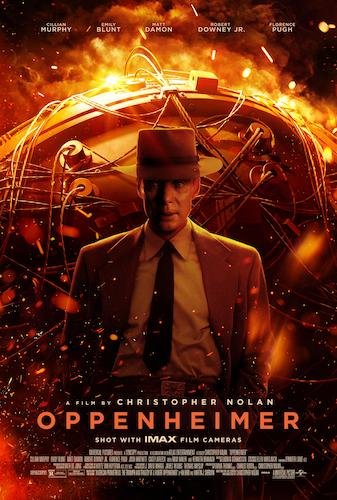Oppenheimer
Written by Andreas Babiolakis
Warning: You will find minor Oppenheimer spoilers in this review. Reader discretion is strongly advised.
No one expected Christopher Nolan to make a traditional biographical picture, so his latest release, Oppenheimer, comes as a shock to no one. What may be the biggest takeaway here, however, is how sympathetic the typically-cold-and-calculated director gets here, with enough emphasis on who Robert J. Oppenheimer was as a person and not just the unfortunate label bestowed upon him: the father of the atomic bomb. Of course, Nolan will always prioritize the brain over the heart in his films, but at least we are in Oppenheimer’s thoughts here which naturally connects to his emotions and grievances. The screenplay was reportedly written by Nolan in first person and on red paper, which again details that he wanted this to be as personal for the theoretical physicist as possible; the red could represent either the hints of heart throughout the film, or the blood Oppenheimer swore was on his hands and no one else’s.
Oppenheimer is an adaptation of Kai Bird’s acclaimed biography American Prometheus: The Triumph and Tragedy of Robert J. Oppenheimer, and Nolan makes good on his promise to be faithful by detailing what exactly Bird’s title means. Prometheus’ mythology details how he stole fire from the Gods of Olympus and provided humans with this spark, resulting in evolution and technological innovation. What transpires is the evils of humanity all in the name of progress. That was Bird’s allegory to the life of Robert J. Oppenheimer, but Nolan had his own as well: T. S. Eliot’s apocalyptic poem, The Waste Land. Nolan shares the notion Eliot had where civilization’s chase for the ultimate goal will result in our termination; the director even includes the bookending rain sequences in Oppenheimer. Additionally, it wouldn’t be a Nolan film without some narrative fragmentation, and Oppenheimer bounces around from a myriad of timelines to tell a somewhat linear story told in the order of one’s looming nightmares of grief. After some imagery, we start with Oppenheimer lost in thought during his 1954 hearing, one that would determine whether or not the physicist was fit to deserve access to Top Secret Restricted Data (as he was during the development of the atomic bomb). Oppenheimer was being pegged as a supporter of Communism during the height of blacklisting. Who was once championed as our saviour due to the massacre of others was now being besmirched as our sworn enemy. Oppenheimer didn’t want either designation.
Cillian Murphy is at his very best as Robert J. Oppenheimer: one of the most mesmerizing performances of 2023 thus far.
Again, Oppenheimer is not told traditionally, but there’s more going on than just time sequence jumping. Nolan specifically sections off a portion of a film in black and white while the rest of Oppenheimer is in full colour. On the surface, Nolan has admitted that the colour portions are all Oppenheimer’s memories of these events told with pure subjectivity, whereas the black and white scenes are objective observations of the witch hunt meant to tear Oppenheimer down (primarily through the perspective of Lewis Strauss: the former chairman of the Atomic Energy Commission who wants to tear Oppenheimer apart purely out of hidden spite). But then even this isn’t the full story. Nolan purposefully gives each style its own title. Colour sequences are “fission” while the black and white ones are “fusion”. Fission relates to the splitting of one nucleus into two nuclei, representing the dissection of one congruent theme into many details about Oppenheimer’s life that the general public likely didn’t know; this forces a split in the film into two parts that run simultaneously. Fusion is when two nuclei amalgamate, depicting the clash between Oppenheimer and Strauss, Oppenheimer and politics, Oppenheimer and his peers, and Oppenheimer and the masses; it also signifies the cohesion that brings this film into one big picture. Both fission and fusion are different methods for achieving the production of energy, and Oppenheimer brings brilliant life and electricity to the physicist’s legacy: one that was marred by different kinds of smear campaigns as the scapegoat of the evils of others.
I was at first a little perturbed by the frantic editing style of Oppenheimer until I quickly realized that I was in the physicist’s mind as it darts back and forth between memories and the present (whatever the present may be). The black-and-white sequences almost read like Oppenheimer’s recollection of transcripts and articles about his hearing and infamy, and there’s no room to interpret any of it otherwise (whereas his own thoughts are full of abstract images, the occasional surreal exploration, and even some moments of second-guessing that subliminally trick you into questioning what you just saw). In the way that Oppenheimer sees his inclusion in the Manhattan Project as the potential start of a chain reaction that would doom us all, he also views his own life cyclically, as if time isn’t linear. I know Oppenheimer is told in a non-chronological fashion, but this idea surpasses even that. I was wondering why we saw Oppenheimer continuously throw drinking glasses at a specific corner of the room in a film that was clearly very decisive with its footage; I deduced that he was maybe experimenting with motion, repetition, or muscle memory. Once we see wife Kitty Oppenheimer throw a glass out of frustration in a nearly identical way, it’s clear that Oppenheimer is telling us something, be it the ability we have to predict our own destructions and the inability to stop them, or something more rooted in scientific theory about reality, cause-and-effect, or chain reactions. This is only one such example. Those rain droplets pop up in other portions of the film, including as an overlay over a map of the world (suddenly, they represent the possibility that bombs will rain all over the world and there is no escape for us: how possible is this if the mere breaking of glass was inevitable?).
The black-and-white sequences in Oppenheimer force viewers into deconstructing what they are presented with little room for thought: a pressurizing predicament that is quite fitting for what they represent in Oppenheimer’s legacy.
To provide some sort of structure here, we may as well go over what the film covers. Yes, we have the hearing that finds Oppenheimer fit or unfit to deal with government information. We also go back to the physicist’s start as a professor who dreamed of bringing his forte to the masses. We find Oppenheimer’s involvement in the Manhattan Project in Los Alamos, New Mexico and the three years it took to develop the atomic bomb. We cut to a different hearing years later: a Senate one for Strauss’ nomination as Secretary of Commerce, where his decimation of Oppenheimer’s name may come back around to bite him in the ass. We also find Oppenheimer’s various romances, from his eventual wife Kitty to his relationship with physician Jean Tatlock; both women and Oppenheimer’s brother, Frank, were affiliated with the Communist Party altogether or at least at one point. Suddenly, this theme of cause-and-effect ripples through all of Oppenheimer, especially given the way the story is told in a nonlinear fashion.
For those that aren’t science aficionados, Oppenheimer is a tale of circling grief where the scientist tries to figure out where all of these outcomes are derived from. He never fights because he continuously blames himself, much to the chagrin of Kitty. We never once see the actual bombings in Hiroshima and Nagasaki, but we do witness Oppenheimer’s nightmares of the damage he caused (Nolan casting his own daughter as one of the victims of said bombings is a heartbreaking touch). Of course, Oppenheimer isn’t solely responsible for this destruction, and others may confirm this by trying to assure him that he isn’t solely to blame, but it isn’t how he feels. We all know the iconic quote that he interpolated from the Bhagavad Gita: “Now I am become Death, the destroyer of worlds.” We see where Nolan saw fit for Oppenheimer to discover the line Vishnu originally stated in the Hindu text. Instead of having Oppenheimer say the line as he did in cookie-cutter biopic fashion, Nolan savours this line as a voiceover during the silence when the atomic bomb finally works as intended: the start of the chain reaction that would soon follow the cacophonous, audible blow that kicks us in our seats with an unfathomable wallop. Where are the people that want to proclaim that Christopher Nolan is sterile again?
While a biopic in the barest sense, Oppenheimer is one of Nolan’s most artistically enriched films.
Oppenheimer boasts one of the largest casts of the year, from the obvious big names (Robert Downey Jr., Emily Blunt, Florence Pugh) to the side roles and cameos no one saw coming (Josh Hartnett, Gary Oldman, Olivia Thirlby, et cetera), but the performance of the hour goes to Cillian Murphy as Robert J. Oppenheimer, who has never been better. He barely feels the need to steal the scene, and yet he does so always. No matter who he is up against, Murphy ironically shines as the sullen physicist who once beamed with a spark of innovation and was extinguished and condemned by those that used him for their own benefit. His antsiness matches Jennifer Lame’s choppy editing; his admiration for science pairs up with Hoyte van Hoytema’s exquisite cinematography (the best of 2023 so far) as you view the world in Oppenheimer’s once-optimistic vision; his riffing of scientific prose equals Ludwig Göransson’s fleeting-yet-devastating score which is equal parts tribute to Philip Glass’s wandering, escalating search for discovery, and Hans Zimmer’s bellowing boom. Then there is Murphy’s waltz with Nolan: the best dance of them all, as both minds tiptoe around the controversy society wanted to be associated with Oppenheimer and dive head-first into the misunderstood side we must know. Did Oppenheimer play a massive role in the atomic bomb? Yes. He was also human and was used conveniently as the source of blame when others didn’t want their hands dirty.
Oppenheimer is a cautionary tale of the inevitable. We will end ourselves one day, if not during Oppenheimer’s experiments or the actual deployment of the atomic bombs in Japan, now; if not now, eventually. Oppenheimer would have never escaped guilt because the bomb was going to be used at some point. Adolf Hitler died and Germany surrendered, yet the bomb was still deemed necessary to protect the United States; even Oppenheimer believed it so at first. The atomic bomb was used in Japan, but that didn’t suffice. He was asked to create an even bigger bomb to stop the Soviets, but Oppenheimer opposed it because he finally realized the severity of his own actions. For that, he was deemed an enemy to his nation, and his past — where he blatantly denied ever becoming a Communist no matter who persuaded him, mind you — was brought back to destroy him. Cause-and-effect.
The film may start with jarring snippets that you swiftly become acquainted with as the film shatters itself, but it ends with a quote that unites the entire motion picture in a way that demands you see Oppenheimer twice (there’s fission versus fusion again): Oppenheimer’s declaration that society will forever be doomed. We will always have the threat of nuclear fallout looming over our heads (we just had these instances recently, particularly with Russia’s threats and war versus Ukraine). We will see civilizations fund billions of dollars into their military because a society without defence is a sitting duck; I am anti-war, and yet I recognize this sad importance. Oppenheimer is full of moments with countdowns, but life itself is a perpetually ticking clock that questions when the inevitable will happen. Because it will. Hopefully not in our lifetime, and the idea is that it never will happen, but Oppenheimer and Albert Einstein knew this unfortunate fact and Nolan figures we should as well: it will happen. Oppenheimer’s bomb was always going to be used maliciously (as then-president Harry S. Truman told him, he provided the ace and the government decides when to play the hand). He was always going to be painted as a monster, be it the sole representation of the atomic bomb or as. a communist rat. The war to end all wars was sadly just the opening chapter of a new novel. If it wasn’t the Cold War, then it’s something else, and we have seen somethings else pop up time and time again.
Oppenheimer is easily one of the best films in recent memory, a high point for Christopher Nolan and biographical pictures, and so much more. What cements it as an urgent watch is not just its artistry, technical prowess, or narrative achievements. It is its political and societal importance. In the way Stanley Kubrick was poking fun yet warning us about nuclear fallout in his satire Dr. Strangelove, Nolan is repeating this similar idea in a vehicle contemporary audiences will eat up: the biopic. He provides us with a warning through some of his finest filmmaking to date (which says a lot, given the calibre of his output). Most importantly, Nolan finally gives us some of his most emotional directing to date. He savoured it for a film that demands our connection more than ever.
We have suffered economic crises again and again since 2008’s short, and we can pretend that we resurfaced when we never did. We can proclaim unity and progress when societies continue to schism and leap backwards with injustices. We can feel safe when there are new dangers always being conceived. Oppenheimer’s grief is an ouroboros that determines that history repeats itself and that evil sadly never dies. Oppenheimer the film is the promise that we will end ourselves. We just have to prolong when the detonation will go off. The inventions of others will always be used for sinister purposes, whether the inventors intend for this or not. They have no say. They never did. Need I bring up artificial intelligence again, outside of pointing out how algorithmic coding can never churn out a film as caring about such a bleak subject and figure as Oppenheimer is? Oppenheimer may be beautifully shot and scored and cleverly told, but its message is as horrifying as Robert J. Oppenheimer’s revelation: our progression is our regression, and our sparks of genius will be our downfalls.
Andreas Babiolakis has a Masters degree in Film and Photography Preservation and Collections Management from Toronto Metropolitan University, as well as a Bachelors degree in Cinema Studies from York University. His favourite times of year are the Criterion Collection flash sales and the annual Toronto International Film Festival.









